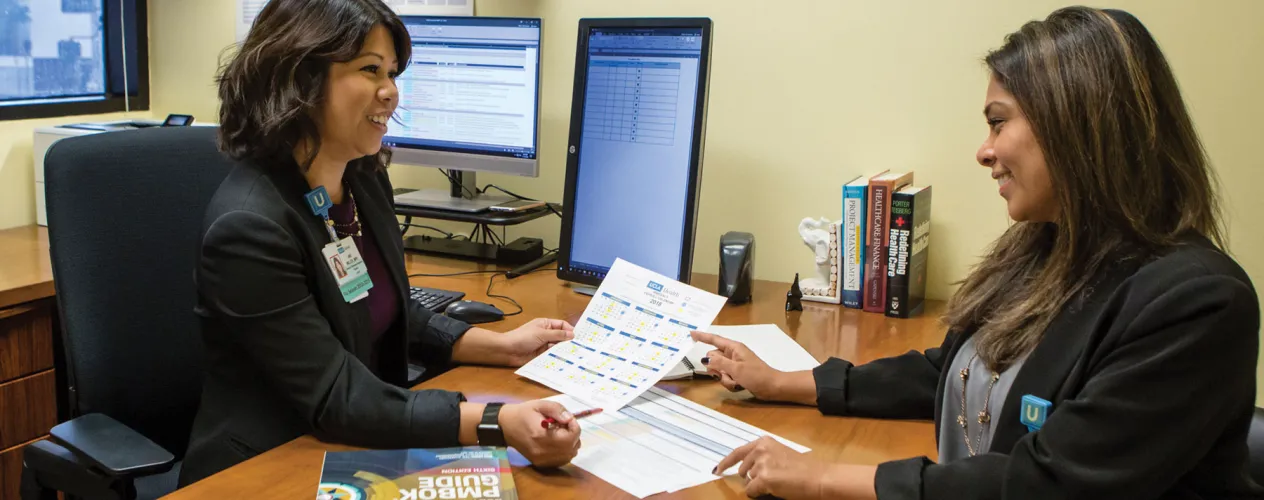Extra Credit
FSPH's Executive Programs in Health Policy and Management allow working health professionals to gain new skills.

CARLOS CHAVEZ (MPH ’18) already had an established career at health insurance provider Anthem Inc. when he decided to enroll in FSPH’s Executive Master of Public Health (EMPH) to fill in gaps in his health policy and management knowledge. The program made it possible for Chavez to take classes toward his degree on weekends while continuing in his full-time job. But right before he was about to graduate, Chavez realized he wanted to tack on another skill that seemed to be in heavy demand.
People arrive in management positions through many different paths.
“I was getting involved in a lot of projects at work as a contributor, but not as a manager,” Chavez says. “As I started to look for a new position, I noticed many hiring managers wanted people with project management skills or certification.”
Chavez learned that in addition to offering a degree program for working professionals, UCLA’s Executive Programs in Health Policy & Management, based in the Fielding School, include a project management workshop. Over the course of two weekends, Chavez learned how to manage all phases of a health care-focused project and how to use project management software. Chavez, now a business change manager at Anthem, is currently working with information technology and business colleagues to create a new payment system for some providers in Anthem’s care network.
Like Chavez, most people who sign up for FSPH’s professional development workshops are looking to get a boost in their careers, says Dr. Leah Vriesman, director of Executive Programs in Health Policy & Management and adjunct associate professor at the Fielding School.
“People arrive in management positions through many different paths,” Vriesman says. “They may have a health care background, such as a radiology technician or licensed vocational nurse, and have an aptitude for managing people. They may then find themselves managing the organization’s process improvement processes and they start to realize they don’t have project management skills or quality metrictracking skills they need.”
FSPH offers several courses for health administration professionals, which can be taken alone or as part of a series. Topics include:
- Health Care Transformation & Performance Excellence. Attendees in these courses are encouraged to think through how they would improve everyday processes at work to make them more efficient. Participants learn about gathering data and applying basic statistical analyses to their data sets, and then create visual representations of their data that others can understand.
- Health Care Project Management. These courses, offered over two weekends, can be used to satisfy the required 35 hours of education for certification from the Project Management Institute as a Project Management Professional. Niki Miller (MPH ’16), a graduate of FSPH’s EMPH program who is now director of business operations for UCLA Health, used the knowledge she learned from this series to implement standards in projects that she manages, such as one involving credentialing software. “After obtaining my MPH, I read books about project management, but this course helped me learn a structured approach and hands-on problem-solving techniques,” Miller says.
A Foot in the Hospital Door: Early Workforce Development
AS PART OF THE UCLA EXECUTIVE PROGRAMS in Health Policy & Management, the COPE Health Scholars program enables recent college graduates or soon-to-be graduates who are interested in health care-related careers to obtain clinical and administrative experience at hospitals.
The program provides 240 hours of hands-on experience, which includes tasks such as taking blood pressure readings, feeding and transporting patients. The students also shadow physicians, work alongside hospital administrators and take a short course on the basics of the U.S. health care system and medical technology.
Often, students find that they want to go into the medical field but then get into a hospital situation and realize they can’t stand the sight of blood, or that patient care is just not for them,” says Kyle Sullivan, associate director of recruitment and operations for FSPH’s Executive Programs. “Instead of giving up their passion for health care, they can see through this program that there are options in health care management.”
For students who complete the program and decide they are interested in direct patient care, the program is a great addition to their medical school and nursing school résumés, says Dr. Leah Vriesman, director of Executive Programs in Health Policy & Management.
Instead of giving up their passion for health care, [students] can see through this program that there are options in health care management.
Nika Harutyunyan, a second-year resident in internal medicine at UCLA, participated in the COPE program while an undergraduate and says she had the opportunity to work with numerous patients, including adults diagnosed with cancer and children ailing from severe developmental delays.
“When I started medical school, I realized how confident I had become in navigating the health care system as a result of COPE,” she says. “I found myself having an easier time than most interacting with patients, addressing multidisciplinary concerns and having an overall familiarity with the world of medicine.”
Faculty & Staff Referenced by this Article

Director, Executive Programs in Health Policy and Management
